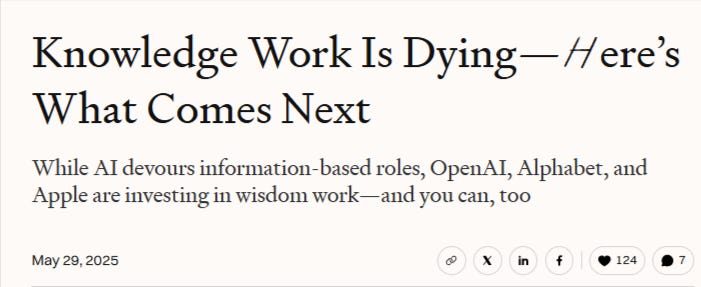
Introduction: Beyond the "Death" of Knowledge Work
The provocative declaration that "knowledge work is dying" captures a significant technological shift but misdiagnoses humanity’s adaptive future. It's true that Artificial Intelligence can now absorb entire fields of study in days, generate flawless code, and optimize complex strategies in seconds. This capability certainly commoditizes raw information and technical execution.
Yet, this evolution doesn't render human knowledge obsolete. Instead, it repositions knowledge as the essential foundation upon which a more profound human contribution emerges: wisdom-centric work. As philosopher Erik Reagan aptly put it,
"Knowledge is knowing a tomato is a fruit; wisdom is knowing not to put it in a fruit salad."
In this new paradigm, wisdom—that blend of experience, ethics, and insight—becomes the irreplaceable human differentiator, transforming how we collaborate with AI, make decisions, and create lasting value.
What Wisdom Truly Means: Beyond Abstract Ideals
Wisdom is often romanticized, seen as the exclusive domain of elders or philosophers. In reality, it is a practical, learnable skillset that combines our cognitive, emotional, and ethical capacities. Drawing on insights from psychology, philosophy, and organizational science, we can define wisdom as:
"The contextual application of knowledge, guided by ethical intelligence, emotional acuity, and systemic discernment, to navigate uncertainty and foster human flourishing."
Let's break this down further with established frameworks:
The Berlin Wisdom Paradigm, a prominent psychological model, identifies five key criteria for wisdom. These include not just factual and procedural knowledge (knowing what and how), but also lifespan contextualism (understanding things within the broader sweep of life experiences), value relativism (recognizing and respecting diverse values), and effective uncertainty management (making sound judgments in ambiguous situations).
Neuropsychological research offers further clarity, confirming that wisdom isn't just about cold logic. It involves an integration of the prefrontal cortex (responsible for judgment and reasoning) with the limbic system (the seat of our emotions). This deep integration is something current AI, for all its power, lacks.
Building on Peter Drucker's groundbreaking 1959 concept of the "knowledge worker," wisdom work can be seen as the next evolutionary stage. We are shifting from an emphasis on mastering information to a focus on meaning-making—understanding the deeper significance and implications of that information.
Unlike AI, which excels at statistical prediction based on data, human wisdom comfortably embraces ambiguity. It compels us to ask not just "What can be done?" but "What should be done?" especially when faced with competing values, complex emotions, and long-term consequences.
The Wisdom-AI Symbiosis: Partnership, Not Replacement
The future isn't a contest of humans versus AI; it's one of humans with AI. This symbiotic relationship allows each to play to its strengths. For instance, Moderna’s deployment of 3,000 GPT agents illustrates this partnership: AI handles complex data synthesis and analysis, freeing human experts to focus on wisdom-driven tasks like ethical validation of AI outputs and ensuring emotional alignment with patient needs. This collaborative model demands new human skills:
Core Skill 1: Emotional Clarity as Data Interpretation Emotions are not mere distractions; they are high-resolution signals offering vital information. As one expert notes, "Obsessing over pros and cons lists? These aren’t thinking problems; they’re feeling problems." Wisdom workers learn to differentiate between raw emotions (like anxiety, which might indicate a hidden risk) and reactive behaviors. They can even use AI to identify recurring patterns of avoidance (e.g., an AI might spot a behavioral loop: "I avoid potential failure → I play it safe → I ultimately feel like a failure"), but it's human insight, often an embodied "gut feeling," that breaks these cycles. This skill can be developed through practices like somatic awareness training (learning to listen to the body's signals) and cognitive bias audits (systematically checking our thinking for common errors).
Core Skill 2: Values-Guided Discernment With AI capable of generating vast amounts of data and countless dashboards, the ability to cut through the noise is paramount. Research shows that choice overload can paralyze us; one famous study found that offering 24 jam options resulted in a 3% purchase rate, while 6 options yielded a 30% rate. Similarly, data paralysis can harm executive health, with a third of managers reporting negative health impacts. A wisdom worker’s first task is discernment: to synthesize technical data with broader cultural, historical, and human contexts and constantly ask, "What truly matters here? Why?"
However, identifying what matters is incomplete without asking what is right. This is the second half of the skill: values-guided navigation. When AI presents ten statistically optimal market strategies, the wisdom worker applies a crucial ethical and purposeful filter, asking: "Which of these options aligns with our core purpose? What kind of future will this choice help create?" Satya Nadella’s emphasis on an "empathy mindset" at Microsoft, which contributed to a remarkable tenfold increase in the company's valuation, is a powerful example of this skill in action. It’s about transforming raw data not just into a meaningful narrative, but into principled action.
Core Skill 3: Relational Agility in Human Ecosystems Google’s Project Aristotle famously found that psychological safety—not individual IQ—is the primary driver of high-performing teams. Psychological safety means team members feel safe to be vulnerable, to admit mistakes, and to voice dissenting opinions without fear of retribution. Wisdom workers cultivate this through what can be called VIEW:
Vulnerability: Sharing uncertainties and imperfections to build trust.
Impartiality: Striving to mitigate personal bias, especially in conflict.
Empathy: Sensing and responding to the spoken and unspoken needs of others.
Wonder: Approaching situations with curiosity rather than premature judgment. This agility is developed through experiences like cross-cultural immersion and consistent feedback rituals.
Core Skill 4: AI-Human Symbiotic Fluency This overarching meta-skill involves orchestrating the human-AI collaboration effectively. It includes:
Prompting for Wisdom: Instead of just asking AI, "Give me solutions," a wisdom-fluent user might prompt, "Identify potential ethical blind spots in this proposed decision."
Using AI as a Mirror: Employing AI simulations to test one's own discernment, for example, by asking, "Run scenarios if we prioritize short-term profit over long-term community well-being."
Enforcing Boundaries: Crucially, knowing when not to delegate decisions to AI, particularly those involving deep emotional understanding, complex moral dilemmas, or nuanced human relationships.
In essence, AI can provide data and trends (e.g., market shifts); the human then links this to cultural or historical forces. AI might translate languages; the human reads the subtle micro-expressions and emotional undertones. AI can optimize for efficiency; the human insists on checks for equity and fairness. This is the dance of symbiotic fluency.
Wisdom in Action: Real-World Recalibrations
Industries are already beginning to shift towards these wisdom-centric models:
Healthcare: AI can rapidly diagnose routine conditions or analyze scans, allowing doctors to dedicate more time to integrating these technical results with patient narratives, life quality goals, and complex ethical considerations.
Law: AI can draft standard contracts or sift through case law in minutes, freeing attorneys to focus on the ethical implications of a case, the relational nuances of negotiation, and strategic legal reasoning.
Content Creation: AI can generate basic templates, outlines, or even draft copy. However, marketers and creators imbued with wisdom inject true meaning through compelling storytelling, empathy for the audience, and culturally relevant insights.
As Microsoft’s Satya Nadella has emphasized,
"Empathy isn’t soft—it’s the hardest competitive advantage to automate."
Recognizing this, organizations like Google now train their engineers in mindfulness and emotional intelligence through programs such as "Search Inside Yourself." These initiatives prove that cultivating wisdom skills not only boosts innovation but also reduces burnout and enhances well-being.
Cultivating Wisdom-Centric Organizations
Transitioning from information-processing "knowledge factories" to dynamic "wisdom ecosystems" requires a deliberate cultural shift:
Hiring for "Why?": Prioritizing candidates who demonstrate deep curiosity, a capacity for critical thinking, and a drive for purpose over those with mere credentials. As Pavan Arora of IBM notes, "AI is the engine, but content [which includes wisdom] is the fuel."
Promoting Psychological Safety: Actively rewarding vulnerability and intellectual humility. An environment where saying "I don’t know" is seen not as a weakness, but as an invitation to "Let’s explore together."
Treating AI as a Wisdom Apprentice: Using AI tools, like Moderna’s GPT agents, to handle rote execution and data processing, while humans actively mentor the AI's application by providing contextual understanding and ethical guardrails.
Developing Wisdom Metrics: Moving beyond tracking just speed and efficiency to measure decision quality, ethical outcomes, team resilience, and long-term impact.
Critically, wisdom work often demands slowness and reflection. Unlike AI’s capacity for instant answers, human wisdom metabolizes experience. It requires time for contemplation, learning from mistakes, and integrating diverse perspectives—what psychologist Paul Baltes referred to as "the residue of mistakes transformed by time."
Conclusion: The Indispensable Human
The rise of AI does not spell the end of human relevance; rather, it heralds the dawn of the age of wisdom-centric work. Knowledge remains essential, but it serves as the baseline, the entry point. Wisdom is the apex: the uniquely human capacity to integrate knowledge with compassion, ethics, and contextual brilliance. Peter Drucker foresaw that
"The most valuable assets of a 21st-century institution will be its knowledge workers and their productivity."
Today, their productivity—and indeed, their irreplaceability—hinges on wisdom.
We must reject the false dichotomy of "knowledge versus wisdom." As wisdom researcher Monika Ardelt wisely states,
"Knowledge without wisdom is double folly."
The individuals and organizations that thrive in the AI era will be those dedicated to cultivating the core wisdom skills outlined here—not as a way to resist AI, but to harness its power with humanity’s deepest capacities. In this profound symbiosis, we don’t just survive the AI age; we elevate it, ensuring that technology serves human flourishing.
Ultimately, in this new landscape,
"Competence is now table stakes. Wisdom is the currency of impact."




